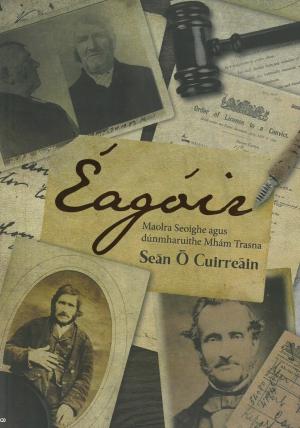En 2016, l'ancien commissaire irlandais en charge de la langue irlandaise, Seán Ó Cuirreáin, publia un livre intitulé Éagóir (injustice) (1), relatant l’histoire de cet Irlandais du canton de Galway, Malora Seioghe (en anglais Myles Joyce) injustement condamné à mort. Malgré ses protestations d’innocence, il fut pendu en décembre 1882. Mais il se débattit plusieurs minutes déajustant la corde, ce qui prolongea son supplice et lui permit de continuer à protester en irlandais.
En effet, le pauvre bougre ne parlait qu’irlandais et ne comprenait pas l’anglais, langue qui était utilisée à Dublin, ville où avait été déporté le procès. Celui-ci aurait eu lieu à Galway, il aurait été possible de trouver des traducteurs bilingues mais à Dublin, on ne trouva qu’un policier seul capable de traduire péniblement de l’irlandais en anglais mais pas l’inverse. Aussi le pauvre Malora Seioghe ne put-il comprendre ni les mots de son défenseur, ni ceux du juge et des jurés (2).

136 ans après sa mort, en avril de cette année 2018, il vient d’être innocenté par le Président de la République irlandaise, Michaël D. Higgins. Ce dernier a reconnu que Malora Seioghe avait été pendu pour un crime qu’il n’avait pas commis. Et que le procès était une erreur judiciaire. Il ajoutait, qu’aujourd’hui encore en Irlande, une discrimination systémique et des différences linguistiques étaient encore à l’oeuvre.
On peut retrouver traces de semblables injustices dans toutes les langues minoritaires en général et les langues celtiques en particulier. C’est le drame commun de toutes ces langues d’être de plus en plus minorisées.
(1) Éagóir - Sean O Cuirreain
This is the story of barbaric murders committed in the dead of night in the midst of a rural community in Joyce Country, on the border between counties Galway and Mayo in 1882. This is an in-depth and clear telling of that moment in history that is still alive in the collective community memory. The crux of the story is the unjust hanging and life imprisonment of innocent people based on the testimonies of false witnesses, traitors and the dishonesty of the authorities and the gentry. This is a new telling of the whole story with photographs and official records which were never published before in the the form of a book.
'It is a good thing that attention is focused on this injustice, and I suggest the effort that is being made to create Maolra Seoighe's innocence and maybe clear its name.' - The President, Michaël D. Higgins, at a commemorative event in Galway, December 15, 2012.
Winner of an Oireachtas na Gaeilge Literary Prize in 2015.
Dúnmharaithe barbartha i ndorchradas na hoíche i bpobal iargúlta i nDúiche Sheoighe, ar an teorainn idir Gaillimh agus Maigh Eo, sa bhliain 1882, a thionscain an scéal seo. Insint líofa léir atá sa leabhar seo ar an eachtra staire úd atá greanta go glé fós i ndaonchuimhne an phobail lenar bhain sí. Baineann croí an scéil le crochadh éagorach agus príosúnú saoil ar dhaoine neamhchiontacha bunaithe ar fhianaise bhréige, ar bhrathadóirí, agus ar mhímhacántacht na n-údarás agus na n-uaisle. Insint úrnua í seo ar iomlán an scéil le pictiúir stairiúla agus taifid oifigiúla nár foilsíodh cheana i bhfoirm leabhair.
'Is maith an rud é go bhfuil aird dírithe ar an éagóir seo, agus molaim an iarracht atá ar bun chun neamhchiontacht Mhaolra Seoighe a chruthú agus b'fhéidir a ainm a ghlanadh.' - An tUachtarán, Micheal D. Ó hUigínn, ag ócáid chomórtha i nGaillimh, 15 Nollaig, 2012.
Bronnadh Duais Oireachtais ar an leabhar seo in 2015.
(2) Pardon in an 1882 hanging - The New York Times, April, 9, 2018